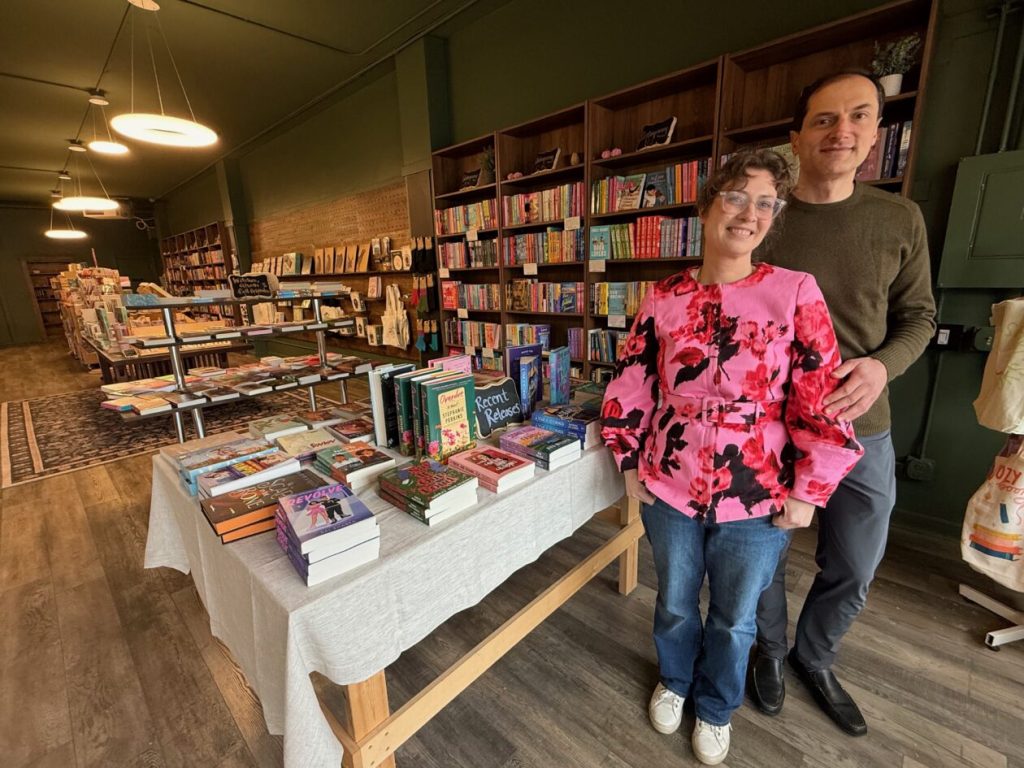Swoon City: Where Tech Meets Romance in Seattle’s New Bookstore
In the heart of Seattle’s Ballard neighborhood, a unique bookstore has opened its doors, blending the worlds of technology and romance literature in an unexpected way. Marissa Coughlin, who recently left her career in tech communications at companies like Airbnb and T-Mobile, has partnered with her software developer husband Constantine Vetoshev to launch Swoon City, a romance bookstore and crafting hub that demonstrates how artificial intelligence can empower small business owners. While Coughlin has stepped away from corporate tech life, she’s bringing technological innovation with her into this new chapter of entrepreneurship, showing that AI can be a powerful ally for independent retailers without compromising the human touches that make a bookstore special.
The couple’s journey to bookstore ownership began in 2023 when they started developing a business plan while juggling careers and raising two small children. When a perfect space became available on Market Street in Ballard—previously occupied by a store called Monster that sold clothing and crafts—they seized the opportunity despite the timing not being exactly as they had planned. Their shared love of reading and Coughlin’s desire to create a community space dedicated to a genre that doesn’t always receive the respect it deserves in literary circles drove them forward. The store officially opened its doors last month, bringing 3,000 carefully selected romance titles to Seattle readers who are part of a growing national trend. Industry analysis shows romance is the leading growth category in print books in 2025, with volume more than doubling compared to four years ago—51 million units sold in the past twelve months—largely driven by Gen Z readers and the influential BookTok community on TikTok.
What sets Swoon City apart from traditional bookstores is its innovative use of AI in business operations. While Coughlin is adamant that artificial intelligence has no place in creating the actual content of the books she sells or designing their covers, she enthusiastically embraces how it can streamline behind-the-scenes work. “I think more businesses should be using this stuff, especially small businesses, if they can figure out how to tap into it,” Coughlin explained. “It’s super useful, but you have to know that it’s there and what it can do, and be a little bit creative and figure out the solutions.” This perspective reflects a nuanced understanding of AI’s potential—not as a replacement for human creativity, but as a tool that can handle repetitive tasks and data analysis, freeing owners to focus on the personal touches that make a small business special.
The couple’s tech backgrounds have allowed them to implement several AI-powered systems that would typically be beyond the reach of a new independent bookstore. They built a custom generative AI tool to categorize their romance novels into detailed sub-genres, enhancing the shopping experience by helping customers quickly find exactly what they’re looking for. For example, rather than simply labeling a book like “Thirsty” as paranormal romance, their system identifies it as paranormal romance, LGBTQ, enemies to lovers, vampire romance, romantic comedy, and urban fantasy—categories that resonate with romance readers who often search by tropes and themes. They also analyzed Seattle Public Library data on the most-borrowed romance novels over the past 18 months to inform their inventory selection, ensuring they stock titles with proven appeal to local readers. Additionally, Vetoshev, who describes himself as “all in” on Anthropic’s AI assistant Claude, used the tool to develop a custom customer loyalty program after it suggested they could build their own system rather than purchasing an existing one.
This integration of technology into business operations allows the couple to accomplish more with limited resources. Vetoshev, who maintains his full-time position at health technology startup Brook.ai, can contribute to the bookstore’s technical needs during evening hours after the children are in bed. “A couple of hours of work with a [large language] model, and we’re off to the races,” he noted, highlighting how AI tools compress development time for small business projects. Coughlin sees their technical solutions as potential resources for others considering similar ventures: “I feel like there’s a lot of things that we’ve created for this store that other people who might be curious about doing something like this could tap into and be able to leverage for their own stuff.” This perspective reflects a spirit of community support that extends beyond the physical space of their store.
Beyond selling books, Swoon City aims to foster connection through various events and crafting classes. Coughlin is planning to build out offerings in embroidery, stained glass, jewelry making, and more, creating a multifaceted community hub that celebrates creativity in many forms. The store hopes to follow the successful model established by The Ripped Bodice, a pioneering independent romance bookstore with locations in Los Angeles and Brooklyn. At its core, Swoon City represents a blend of technological innovation and human connection, using AI to handle the administrative burdens of retail while creating space for people to gather around shared interests. “I feel like part of what was exciting for a romance bookstore is the community,” Coughlin explained, “because it is often not a genre that’s as well respected in the book community, even though it’s huge.” In this way, the store embodies a thoroughly modern approach to bookselling—one that embraces both technological advancement and the timeless appeal of stories about love and connection.


